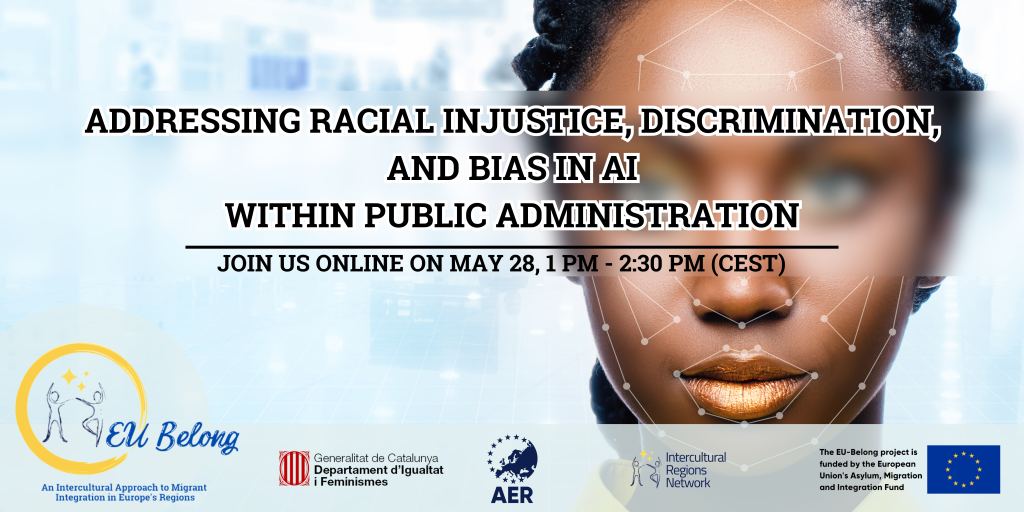We are a network
Multiple times per year, AER brings together regions, so that they may stand stronger together, and grow in a space of best practice exchange.

- This event has passed.
Addressing Racial Injustice, Discrimination, and Bias in AI within Public Administration
28 May 2024 13:00 - 14:30

Join the conversation! On 28 May 2024 the AER and the DG of Migration, Asylum and Antiracism of the Government of Catalonia organised a webinar on “Addressing Racial Injustice, Discrimination, and Bias in AI within Public Administration” in the context of the EU-Belong knowledge transfer clusters
Public administrations and their service providers are increasingly using AI applications to accelerate their operations, analyse big data sets, assess risks and make decisions. Usages may involve for instance support to recruitment processes, fraud control, the assessment of requests for benefits, the security of public spaces or border control.
Risks of AI usage in public services
Several studies, including the Council of Europe’s 2023 Study on the impact of artificial intelligence systems (…), have highlighted the risks of artificial intelligence (AI), with regards to increased discriminations of vulnerabilised people. Automated decision-making systems, have indeed in some cases led public administrations to implement wide systems of discrimination and unprecedented injustice.
A changing legal landscape
In March 2024, the European Parliament adopted the EU Artificial Intelligence Act (“AI Act”) establishing common rules and obligations for providers and deployers of AI-based systems in the EU internal market. At the same time, the Council of Europe finalised the draft Framework Convention on artificial intelligence, which is the first legally binding global instrument to address the risks posed by Artificial Intelligence and is based on the Council of Europe’s standards on human rights, democracy and the rule of law.
- What is new about these texts?
- What should policymakers be aware of when designing policies and practices?
- What should they be looking at specifically when buying services from consultancies or tech companies?
A webinar for better policymaking
In a rapidly evolving landscape policymakers and regional stakeholders may find it difficult to simultaneously gather useful and up-to-date information, while also identifying areas where they can act and create impact.
This webinar gathered experts who shared:
- how they work to address racial injustice, discrimination, and bias in AI within public administration
- what are the main changes ahead and how to prepare
- what they see as the main elements for effective policymaking and civic participation on the topic of AI & discriminations
- what their advice is to politicians, civil servants, and different regional stakeholders
Draft Agenda
| 13:00-13:07 | Welcome | Laura Sentis Margalef, EU Belong Project Officer, Department for Equality and Feminisms of Catalonia | ||
| 13:07-13:10 | The Intercultural Regions Network | Joan de Lara, Senior officer, Department for Equality and Feminisms of Catalonia | ||
| 13:10-13:20 | Introduction on AI | Sofia Trejo, Researcher in AI Ethics and Specialist in the ethical, social, political, and cultural dimensions of AI, Barcelona Supercomputing Center | ||
| 13:20-13:25 | Q&A | |||
| 13:25-13:35 | AI, discrimination and human rights protection | Menno Ettema, Head of Unit, Hate Speech, Hate Crime and Artificial Intelligence, Directorate of Equal Rights and Dignity, Council of Europe | ||
| 13:35-13:40 | Q&A | |||
| 13:40-13:50 | The intersection between anti-racism and digital rights |
Sarah Chander, Senior Policy Advisor at European Digital Rights and co-founder of the Equinox Initiative for Racial Justice | ||
| 13:50-13:55 | Q&A | |||
| 13:55-14:05 | Fighting racism in digital intelligence | Paula Guerra Cáceres, Antiracist activist and Head of Advocacy at Algorace | ||
| 14:05-14:10 | Q&A | |||
| 14:10-14:20 | Roundtable discussion | |||
| 14:20-14:25 | Q&A | |||
| 14:25-14:30 |
Conclusion |
Laura Sentis Margalef, EU Belong Project Officer, Department for Equality and Feminisms of Catalonia |
More Information on AI in Public Administration
For readers interested in exploring the topics of AI bias and discrimination further, the following resources provide valuable insights and in-depth research:
- Gender Shades: Research on face recognition software and its biases.
- AI Bias and the Roma Community: Fundación Secretariado Gitano (FSG) has published a comprehensive report discussing AI bias in relation to the Roma community.
Read the report in English
Leer el informe en español - EU Artificial Intelligence Act: Learn about the common rules and obligations for AI providers and deployers within the EU internal market.
- Machine Learning Harm Framework: Harini Suresh and John Guttag provide a framework for understanding sources of harm throughout the machine learning lifecycle.
- Amnesty International Case Study: Examine the impact of algorithmic discrimination in public services through the Dutch childcare benefits scandal.
- Recommendations by Sarah Chander (Equinox Initiative for Racial Justice):
– Beyond Bias: Discussion on AI-driven systems and debiasing efforts.
– Civil Society Recommendations on the AI Act: Read the political statement and the recent status update.
– Discriminatory Surveillance and Migration Laws - Algorace Website: For more information on algorithmic fairness and race, visit the Algorace website.
- Council of Europe Resources:
– Framework Convention on AI and HR Democracy and the Rule of Law
– Study on AI and Equality
– Study on Discrimination and Algorithmic Decision-Making
– Committee of Experts on AI, Equality, and Discrimination (GEC/ADI-AI)

